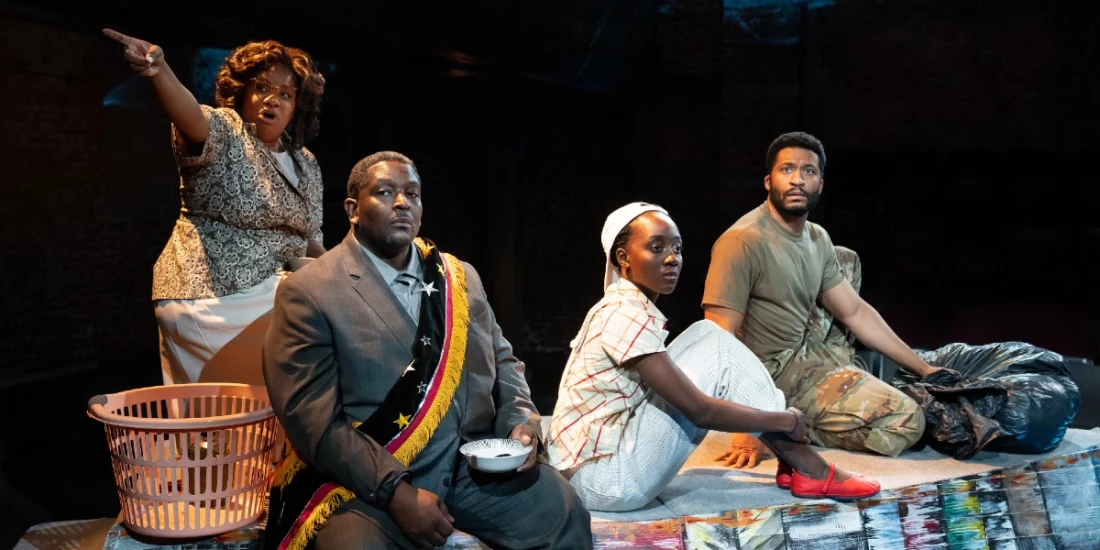'black odyssey' review — 'Odyssey' adaptation provides delight and despair
Read our review of Marcus Gardley's black odyssey, a new play directed by Stevie Walker-Webb, which is currently playing off Broadway through March 26.
Odysseus, the tortured hero of Homer’s Odyssey, spends 10 years lost at sea en route home to Ithaca. Ulysses (Sean Boyce Johnson), a Black American soldier deployed to Afghanistan, travels decades through his own bloodstream to reach his despondent wife and son, searching sea, river, and Harlem for the ancestor who will “baptize you of the blood on your hands,” as Deus (James T. Alfred) tells him, so he will be worthy of his home.
Thus sets sail black odyssey, the modern retelling from Marcus Gardley running at Classic Stage Company. Stevie Walker-Webb directs a Greek chorus of actors who move as one to guide Ulysses onward as his head fills with water and he struggles to remember his bearings. Adrienne C. Moore and Lance Coadie Williams anchor the chorus, gliding from role to role with ease and grounding the heart of the piece as Artez — the proud Grand Marshall in the Second Line parade — and Alsendra, a couple taking refuge on the roof of their home during a Noah’s Ark-scale flood.
UptownWorks, the production company that provided sound design, plays audio of stranded storm survivors neglected by the U.S. government in transition to the flood setting, cementing a link between the Biblical stories of old and climate disasters of today. Most audiences would absorb this link without further instruction, but Artez and Alsendra then explain that God began “spitting curses on the Earth” since the murders of Malcom X and President Kennedy and has been crying 40 days and nights since the assassination of Dr. King.
This rather abrupt tonal shift from the subtle to the heavy-handed characterizes the main structural issue with black odyssey: The play is at times captivating and clever, but it is more interested in reveling in its own cleverness than in seeing its choices through. The unevenness makes Gardley’s script feel a little corny in its reliance on on-the-nose pronouncements; Ulysses welcomes us back from intermission with a cringe-worthy choral proclamation: “American Dream was a nightmare programmed to keep me asleep and broke. But I got news: I’m woke.”
The framing of the Greek gods playing chess with the lives of men guides black odyssey through its highs and lows, and the performances all soar even as the script sours. Jimonn Cole’s bitter Paw Sidin (Poseidon) is a worthy antagonist whose earned ire provides a thought-provoking conflict, while Harriett D. Foy charms and enchants as Aunt Tina (Athena).
The dark comedy provides indulgent updates on Greek mythological figures that delight even as Ulysses despairs: The prophet Tiresias is now “Superfy,” shepherding Ulysses through trials with his disco moves. The Sirens threatening to shipwreck Ulysses now embody Diana Ross, Tina Turner, and James Brown, crooning and kicking in costume designer Kindall Almond’s silver sequins as the audience howls with laughter. Moore’s soul food monologue as Circe is, to pardon the pun, downright delicious.
Tẹmídayọ Amay is also an endearing and adorable treat as the 10-year-old Benevolence, a flood survivor who likes magic, stories, and freeze tag. Gardley and Walker-Webb don’t give the character nearly enough to do, and their near-omniscient presence sometime distracts from a given stage picture. An eventual reveal on the nature of their character doesn’t make up for a lack of development, especially with the gifted Amay proving they can handle more intricate work.
Despite the performances, black odyssey’s central message that the worst of your offenses will be pardoned by the best of your ancestors is a confounding one — especially when we learn of Ulysses’s offense — that muddies the waters of an otherwise gorgeous production.
Photo credit: Adrienne C. Moore, Lance Coadie Williams, Tẹmídayọ Amay, and Sean Boyce Johnson in black odyssey. (Photo by Julieta Cervantes)
Originally published on
